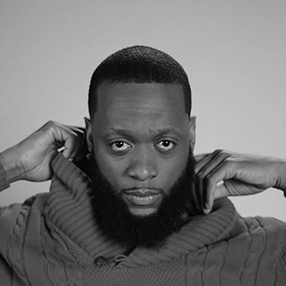Assume the Position
The train came with a police officer
on his gun. He shifts his weight
against the door. A flash back loads
the first time a service weapon was pulled in my face;
the second time it made me lay on the ground;
the third time it put my hands in the air; the fourth time
it pushed me against a wall; the fifth time
it told me it was just doing its job; the sixth time
it kicked my feet apart; the seventh time
it followed me home; the eighth time it grabbed my shirt collar.
Read the signs: it’s illegal to move
between cars.
Read the signs; my body knows
how Klan-rally a cop’s gun feels at eye level.
The ninth time the barrel cocked its head;
the tenth time, it told me it missed me
the last time; it said, burning black bodies is a tradition
it was raised on; the eleventh time the safety and trigger argued
through a range of black fiction. I could’ve been
any made-up one of us: Ricky or Wee-Bey
Mad Max or Tray; we all look the same under the right racism
anyway; the twelfth time it dared me to swing; the thirteenth time
I thought about it; the fourteenth time, I almost did it;
the fifteenth time, there were no cellphones; the sixteenth time
just covered badges; the seventeenth time
it searched me for the broken laws it thought I was;
the eighteenth time I assumed the position without anything
being said.
Copyright © 2020 by Jive Poetic. Originally published in Poem-a-Day on July 20, 2020 by the Academy of American Poets.
“On a crowded train, a police officer stood against the door. His hand was on his gun. It didn’t seem like he was watching anybody in particular. This was his resting position. For a while, I stopped looking in his direction. I didn’t want to appear suspicious. I thought about my high school students and the stereotypes assigned to their bodies. I was their age once and, luckily, I made it out alive. At this point, the cop has done nothing outside of look exhausted; and that’s what scared me: he was fatigued, and his hand was on his gun, and every dead Black man before George Floyd had already happened. A stop later, another Black man got on the train and announced purses for sale. My eyes darted between him and the officer. He recognized my panic warning and stopped his sales pitch before anybody else got triggered. For the rest of the ride, we alternated our glances on and off the cop. A couple of stops later, I worried about fitting a vague description that might come through his radio. This has happened enough times for me to practice phone numbers just in case I got picked up. When I finally got off the train, I thought about the experiences that helped condition my anxiety surrounding police contact.”
—Jive Poetic

